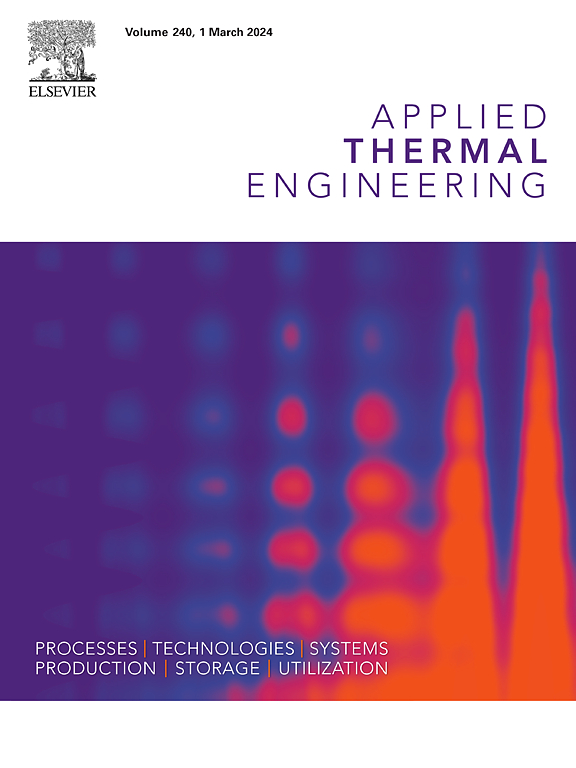Metal-organic framework-based desiccant-coated heat and mass exchanger to engineer effective bus air conditioning systems utilising latent and sensible heat recovery
IF 6.1
2区 工程技术
Q2 ENERGY & FUELS
引用次数: 0
Abstract
The present study evaluates the performance of desiccant-coated heat exchangers (DCHE) that utilise both latent and sensible heat recovery for an energy-efficient bus air-conditioning system. A prototype unit incorporating a metal–organic framework (MOF)-coated DCHE was experimentally and numerically analysed under different environmental conditions. Key performance metrics included humidity ratio difference (Δx) of air supplied to the indoor environment. The prototype unit demonstrated a dehumidification ability of around 2.7 g/kg(DA) with a coolant temperature of 20 °C and a heating fluid temperature of 50 °C. The integration of heat recovery ventilation (HRV) reduced the cooling load by around 15 % compared to without HRV configurations. Geometric modifications, such as increasing the DCHE width to about 2.2 times larger that of the prototype, enabled the DCHE unit to achieve the target Δx of 4.88 g/kg(DA). These results highlight the potential of MOF-based DCHE units to reduce energy consumption in bus HVAC systems, thus contributing to more sustainable transportation solutions.
基于金属有机框架的干燥剂涂层热交换器,利用潜热和显热回收设计有效的客车空调系统
本研究评估了干燥剂涂层热交换器(DCHE)的性能,该热交换器利用潜热和显热回收用于节能客车空调系统。在不同的环境条件下,对金属有机骨架(MOF)包覆DCHE的原型装置进行了实验和数值分析。主要性能指标包括供气室内环境的湿度比差(Δx)。在冷却剂温度为20°C,加热流体温度为50°C的条件下,原型装置的除湿能力约为2.7 g/kg(DA)。与没有HRV配置相比,热回收通风(HRV)的集成减少了约15%的冷却负荷。几何修改,例如将DCHE宽度增加到原型的2.2倍,使DCHE单元达到4.88 g/kg(DA)的目标Δx。这些结果突出了基于mof的DCHE装置在降低公交车HVAC系统能耗方面的潜力,从而有助于实现更可持续的交通解决方案。
本文章由计算机程序翻译,如有差异,请以英文原文为准。
求助全文
约1分钟内获得全文
求助全文
来源期刊

Applied Thermal Engineering
工程技术-工程:机械
CiteScore
11.30
自引率
15.60%
发文量
1474
审稿时长
57 days
期刊介绍:
Applied Thermal Engineering disseminates novel research related to the design, development and demonstration of components, devices, equipment, technologies and systems involving thermal processes for the production, storage, utilization and conservation of energy, with a focus on engineering application.
The journal publishes high-quality and high-impact Original Research Articles, Review Articles, Short Communications and Letters to the Editor on cutting-edge innovations in research, and recent advances or issues of interest to the thermal engineering community.
 求助内容:
求助内容: 应助结果提醒方式:
应助结果提醒方式:


